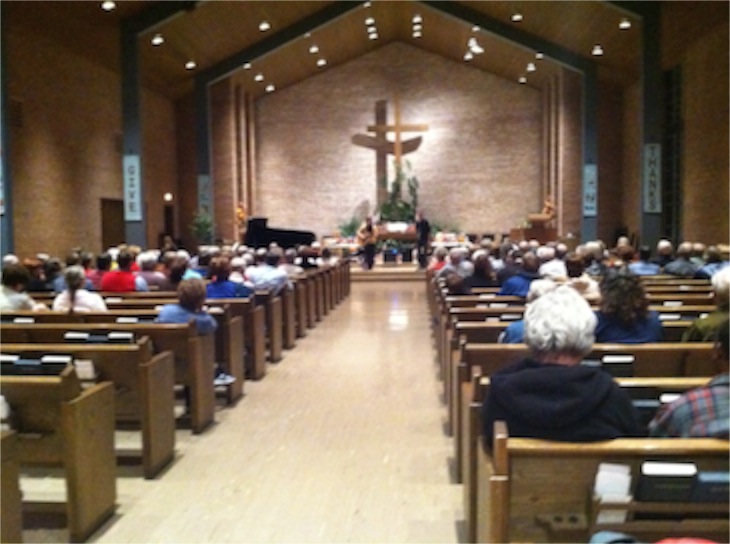Times of Transition
15/02/12 04:35
Transitions are a challenge for us as individuals and for groups and institutions as well. It is difficult to head in new directions and to switch from one set of challenges and opportunities to another. But transitions are unavoidable. Over the past week we have observed our grandson as he learns to cope with the transitions of his life. He can be happy playing when he becomes so tired that he needs a nap. While it is apparent to all the adults around him that he just needs to relax and go to sleep, the process of relaxing can be a challenge. At his age there can be a few moments of tears as he is picked up from his toys and rocked to sleep.
 We too struggle with transitions. After a week of being immersed in family and focusing our attention on our children and grandson, it is time for us to go back to our home and back to work. Travel will take much of our day as we are going from one time zone to another. We have to be prepared to “hit the ground running,” as there are worship bulletins that need to be printed tomorrow morning, a funeral that will take place first thing in the morning, and two additional grieving families in need of our care and attention.
We too struggle with transitions. After a week of being immersed in family and focusing our attention on our children and grandson, it is time for us to go back to our home and back to work. Travel will take much of our day as we are going from one time zone to another. We have to be prepared to “hit the ground running,” as there are worship bulletins that need to be printed tomorrow morning, a funeral that will take place first thing in the morning, and two additional grieving families in need of our care and attention.
Jesus addressed these transitions in the lives of his disciples directly. He urged them to think in terms of a radically new set of relationships. The quote in Luke is really harsh. “If anyone comes to me and does not hate his own father and mother and wife and children and brothers and sisters yes, and even his own life, he cannot be my disciple.” (Luke 14:26). Matthew probably got the quote more accurately: “Whoever loves father or mother more than me is not worthy of me, and whoever loves son or daughter more than me is not worthy of me.” (Matthew 10:37) The issue is not rejection of traditional family relationships, it is understanding that following God’s call radically re-defines family and all of our relationships. We are called to put our priorities in order. John’s Gospel says it in a different way: “The one who loves his life will lose it, while the one who hates his life in this world will keep it for eternal life.” (John 12:25)
Being a leader in God’s realm means becoming a servant. And a servant does not place pleasure or individual desires above God’s call. Some days a loving and devoted father is called to leave his children and focus his attention on serving others. Some days a loving and devoted grandmother needs to love other children as much as she loves the children of her children. Today, even though there is a part of us that would like to remain here for a long time and see our grandson every day, there is another part that knows we are called to serve children who have lost their fathers and grandfathers back in South Dakota. Our family is much bigger than we are. And there are times of transition when we must embrace that larger family.
 Times of transition are also difficult challenges for institutions. Whether it is a church, a service club or a business, there will always be some people involved in any organization that have loved and honored the past so much that they look backwards when they plan or dream of the future. They long to return to the way things were. This, of course, is impossible. God always calls us to the future and the future is never the past. The congregation we serve reached its largest numerical membership in 1951. Since that time there have been periods of decline and growth in membership, but the general trend has been toward a slow and gradual decline. But there are people who remember the full Sunday school rooms and crowded conditions of the 1950’s and who long for the way the church felt in those days. They want leaders who will chase numbers of people and attract large groups of children without genuinely considering the changes in family size and age profiles in our community that mean that times are different. In the worst cases, these people are so focused on the way things once were that they fail to recognize the opportunities for service that greet them every day. They need help with the transition from the way things were to the way things are before they can be captured by prophetic and visionary leadership.
Times of transition are also difficult challenges for institutions. Whether it is a church, a service club or a business, there will always be some people involved in any organization that have loved and honored the past so much that they look backwards when they plan or dream of the future. They long to return to the way things were. This, of course, is impossible. God always calls us to the future and the future is never the past. The congregation we serve reached its largest numerical membership in 1951. Since that time there have been periods of decline and growth in membership, but the general trend has been toward a slow and gradual decline. But there are people who remember the full Sunday school rooms and crowded conditions of the 1950’s and who long for the way the church felt in those days. They want leaders who will chase numbers of people and attract large groups of children without genuinely considering the changes in family size and age profiles in our community that mean that times are different. In the worst cases, these people are so focused on the way things once were that they fail to recognize the opportunities for service that greet them every day. They need help with the transition from the way things were to the way things are before they can be captured by prophetic and visionary leadership.
There are others who are involved in organizations that get caught up in envy of what they think are the qualities and successes of other institutions. The 10th Commandment, Exodus 20:17, clearly teaches that free people do not define themselves by what others have. But this does not stop faithful people from coming to church meetings with descriptions of other churches and a desire to imitate. In its most extreme form, this type of thinking can prevent individuals from sensing God’s call for their own unique institution. God does not call any of us to be someone else. God does not call churches to be other churches. God calls each to a unique form of discipleship, service and ministry.
But responding to the call means going through transitions. And transitions can be difficult. Sometimes, like with our grandson, there can be a few tears involved in getting from one thing to another. We will have to go through the sadness of saying good-bye to our family before we board the plane that will take us back to South Dakota. The ministry to which we are called requires us to face this pain directly. It is small compared to the pain being faced by grieving families back at home. Serving them requires us to put their needs ahead of our own desires. Sometimes a church has to say good-bye to its past in order to welcome new members who are very different from the folks who used to occupy the pews. Sometimes the path of service means going where success or failure is measured by faithfulness and not by statistics.
 “Whoever wishes to save his life will lose it, but whoever loses his life for my sake is the one who will save it. “ (Luke 9:24, Matthew 10:39, Luke 17:33) Real service involves real loss. Real loss involves real grief. In this life of service, tears of joy and tears of sadness often mix on our cheeks as we listen carefully and respond to God’s call.
“Whoever wishes to save his life will lose it, but whoever loses his life for my sake is the one who will save it. “ (Luke 9:24, Matthew 10:39, Luke 17:33) Real service involves real loss. Real loss involves real grief. In this life of service, tears of joy and tears of sadness often mix on our cheeks as we listen carefully and respond to God’s call.
There are many things in life that are far worse than the pain of transitions. And there are transitions in this life that lead us to even greater joy. God keeps calling us to new directions and new possibilities.

Jesus addressed these transitions in the lives of his disciples directly. He urged them to think in terms of a radically new set of relationships. The quote in Luke is really harsh. “If anyone comes to me and does not hate his own father and mother and wife and children and brothers and sisters yes, and even his own life, he cannot be my disciple.” (Luke 14:26). Matthew probably got the quote more accurately: “Whoever loves father or mother more than me is not worthy of me, and whoever loves son or daughter more than me is not worthy of me.” (Matthew 10:37) The issue is not rejection of traditional family relationships, it is understanding that following God’s call radically re-defines family and all of our relationships. We are called to put our priorities in order. John’s Gospel says it in a different way: “The one who loves his life will lose it, while the one who hates his life in this world will keep it for eternal life.” (John 12:25)
Being a leader in God’s realm means becoming a servant. And a servant does not place pleasure or individual desires above God’s call. Some days a loving and devoted father is called to leave his children and focus his attention on serving others. Some days a loving and devoted grandmother needs to love other children as much as she loves the children of her children. Today, even though there is a part of us that would like to remain here for a long time and see our grandson every day, there is another part that knows we are called to serve children who have lost their fathers and grandfathers back in South Dakota. Our family is much bigger than we are. And there are times of transition when we must embrace that larger family.

There are others who are involved in organizations that get caught up in envy of what they think are the qualities and successes of other institutions. The 10th Commandment, Exodus 20:17, clearly teaches that free people do not define themselves by what others have. But this does not stop faithful people from coming to church meetings with descriptions of other churches and a desire to imitate. In its most extreme form, this type of thinking can prevent individuals from sensing God’s call for their own unique institution. God does not call any of us to be someone else. God does not call churches to be other churches. God calls each to a unique form of discipleship, service and ministry.
But responding to the call means going through transitions. And transitions can be difficult. Sometimes, like with our grandson, there can be a few tears involved in getting from one thing to another. We will have to go through the sadness of saying good-bye to our family before we board the plane that will take us back to South Dakota. The ministry to which we are called requires us to face this pain directly. It is small compared to the pain being faced by grieving families back at home. Serving them requires us to put their needs ahead of our own desires. Sometimes a church has to say good-bye to its past in order to welcome new members who are very different from the folks who used to occupy the pews. Sometimes the path of service means going where success or failure is measured by faithfulness and not by statistics.

There are many things in life that are far worse than the pain of transitions. And there are transitions in this life that lead us to even greater joy. God keeps calling us to new directions and new possibilities.